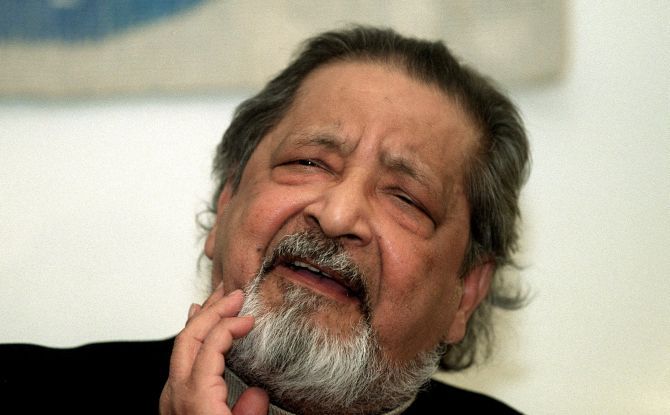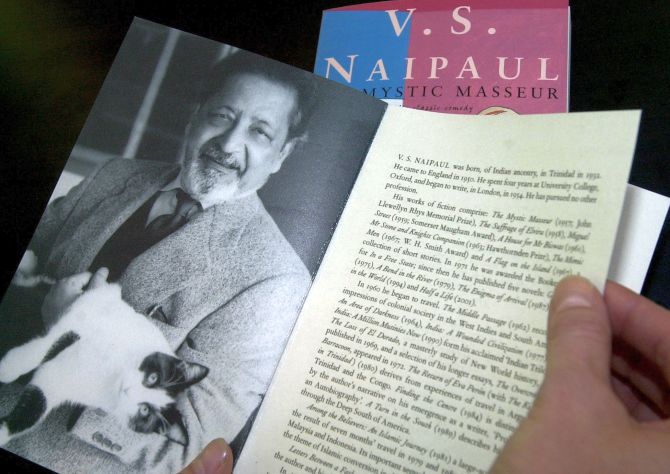V S Naipaul, Trinidad-born Indian-origin author, known for his critical commentary on colonialism, religion and politics, has died at the age of 85, his family said early on Sunday.

'He was a giant in all that he achieved and he died surrounded by those he loved having lived a life which was full of wonderful creativity and endeavour,' his wife Lady Nadira Naipaul said in a statement.
Naipaul, who lived most of his life in England, died in his London home on Saturday.
Vidiadhar Surajprasad Naipaul was born on August 17, 1932 in Trinidad into an Indian Hindu family.
He grew up in relative poverty before moving to England aged 18 after receiving a scholarship to University College, Oxford.
He wrote his first novel while at Oxford University but it was not published and he battled with depression, even attempting suicide, during his struggling student days.
He left university in 1954 and found a job as a cataloguer in London's National Portrait Gallery. He subsequently settled in England, although he travelled extensively thereafter.
Naipaul wrote more than 30 books of fiction and nonfiction during his career with a sharp critique of established religion and politicians characterising much of his work.

His first book The Mystic Masseur was published in 1951, launching his literary career. His most celebrated novel, A House for Mr Biswas, was published in 1961.
The book was based on the life of his father Seepersad Naipaul, who was a reporter for the Trinidad Guardian.
Naipaul went on to become one of the early winners of the Booker Prize for In A Free State in 1971. Among his other well-known works were those on Islamic fundamentalism -- the 1981 work Among The Believers and the 1998 book Beyond Belief.
His other works include Guerrillas (1975), A Bend in the River (1979), A Way in the World (1994), The Mimic Men (1967), The Enigma of Arrival (1987), Half a Life (2001), The Writer and the World (2002) and Literary Occasions (2003), the novel Magic Seeds (2004) -- a sequel to Half a Life -- and In The Masque of Africa (2010).
Naipaul, known as a master of the English language, explored colonialism in his many famous works.
He received numerous honours, including a knighthood by Queen Elizabeth II for his services to literature in 1990.
The British author was awarded the Nobel Prize for Literature in 2001 'for having united perceptive narrative and incorruptible scrutiny in works that compel us to see the presence of suppressed histories'.
He married Patricia Ann Hale in 1955. After her death in 1996, Naipaul married divorced Pakistani journalist Nadira Khannum Alvi, many years his junior.
The outspoken writer was known for his many harsh criticisms, including that of former British Prime Minister Tony Blair -- who he described as a 'pirate' -- as well as literary stalwarts such as Charles Dickens and EM Forster.
He also fell out with American travel writer Paul Theroux, who he had mentored, in a bitter 15-year feud after Theroux discovered a book he had given Naipaul in a second-hand bookshop. They later reunited.
Paying tribute to his friend, who he said had been in poor health, Theroux said: "He also never wrote falsely. He was a scourge of anyone who used a cliché or an un-thought out sentence. He was very scrupulous about his writing, very severe, too."
He 'will go down as one of the greatest writers of our time', Theroux said.
Booker Prize-winning Indian-origin author Salman Rushdie, who had clashed with Naipaul over the years, also paid tribute on Twitter.
'We disagreed all our lives, about politics, about literature, and I feel as sad as if I just lost a beloved older brother. RIP Vidia,' he said.
His feud with Rushdie dated back to when The Satanic Verses author faced a death sentence.
Naipaul said at the time: "I don't know his books but I've been aware of his statements. I found them usually left-wing and trivial and antiquated."
He also seemingly dismissed the fatwa as 'an extreme form of literary criticism'.
Another Indian-origin English novelist and journalist Hari Kunzru recalled interviewing him and said: "When we sat down, the first thing he said was 'tell me what you've read and don't lie'. Only then would he consent to be questioned."








